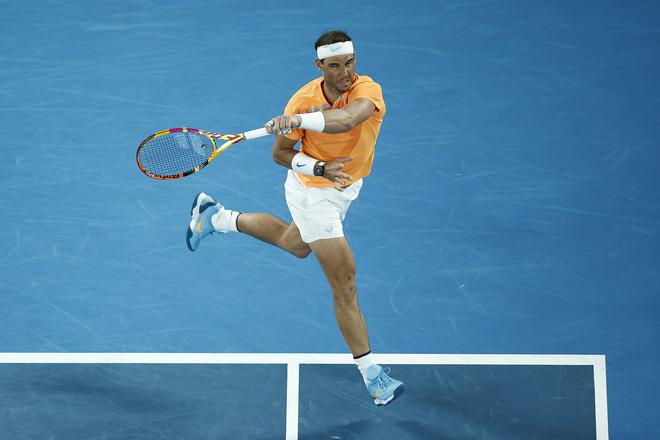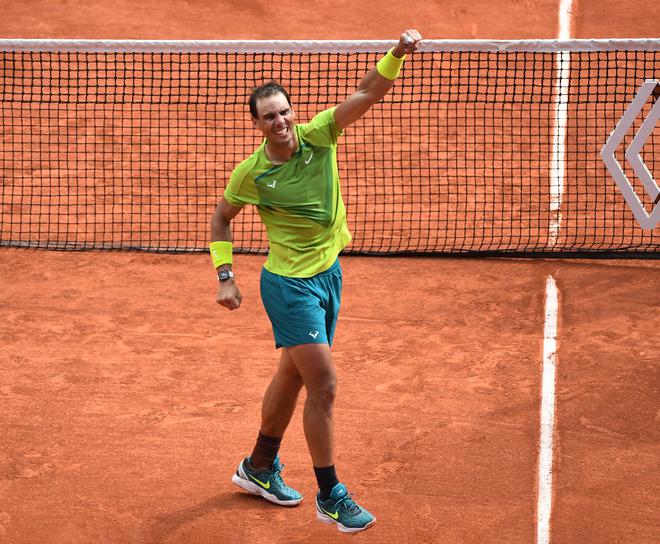

In ‘Levels of Life’, the celebrated English author Julian Barnes confronts the grief of having lost his beloved wife of 30 years through the metaphorical arc of Gaspard-Felix Tournachon, a 19th century adventurer and balloonist who was the first man to take an aerial photograph, of Paris. It’s the chronicling of a journey from the heights to the depths.
“Groundlings, we can sometimes reach as far as the gods,” Barnes writes. “Some soar with art, others with religion; most with love. But when we soar, we can also crash. There are few soft landings … Every love story is a potential grief story.”
In the far removed, less serious world of sport, Rafael Nadal fans will tend to agree. When the 22-time Grand Slam champion is at his best, watching him play is like being “in a permanent state of adolescence, of thrilled discovery”.
Crash landings
But no contemporary tennis player has had as many crash landings as the Spaniard. From his back to his hips to the abdomen to his knees and all the way down to his ankles and toes, all have suffered significant wear and tear over the years, forcing him out for weeks and months.
And in his absence, there has been a sense of irreparable loss. As Barnes puts it, “What is taken away is greater than the sum of what was there. This may not be mathematically possible; but it is emotionally possible.”
It is this misery that Nadal supporters — and the tennis universe at large — will seek relief from when he returns to action at the Brisbane International starting this Sunday, after nearly 12 months out, the longest such break in his career.
The 37-year-old last played a match at the 2023 Australian Open, losing to the unheralded Mackenzie McDonald in straight sets in the second round. During the contest, he was severely hampered by a hip injury, which sidelined him for the rest of the season, including the French Open, a tournament he has won a record 14 times and hadn’t missed since his debut in 2005.
“I have thought many times that it did not make sense,” Nadal admitted earlier this month while announcing his comeback ahead of the season-opener in Australia. “There have been many years, many hours of work in which I did not see the [desired] result. [But] I still believe that I do not deserve to end my sports career in a press room. I would like to finish in a different way.”
There is both a longing to see him whip those trademark down-the-line forehands again and a fear that all of it may come undone in a flash.
Longstanding headline act
One of the greatest competitors of all time, Nadal, alongside his celebrated rival Roger Federer, has headlined men’s tennis for close to a quarter century. Among male players, he was the first to reach 22 Majors, one of only three to win Slams in his teens, 20s and 30s (Ken Rosewall and Pete Sampras the others) and one of four to claim all four crown jewels at least twice (Roy Emerson, Rod Laver and Novak Djokovic the others). He also spent a men’s record 912 weeks (2005-2023) in the top-10.
But with a body as tenuous as a thin sheet of ice on a frozen pond, there is always the threat of a collapse. Breakdowns in the latter half of the season have been so commonplace in Nadal’s career that he has missed Wimbledon and the ATP Finals five and six times respectively and the US Open on four occasions (excluding 2020 which was because of Covid bio-bubble restrictions). In fact, in the second half of 2021, while tending to a chronic foot injury, he even considered retirement.
The test this time is of Nadal’s famed bouncebackability. His most recent comebacks from serious injuries do provide hope. After the slump in 2015 and 2016, Nadal entered 14 consecutive Majors, triumphing in six, finishing runner-up twice and making four other semifinals.
In 2022, he went 36-3 until Wimbledon, securing four titles. It included the record-breaking 21st Slam in Australia, with an improbable come-from-behind five-set victory over Daniil Medvedev, and a record-extending 22nd at Roland-Garros which was made possible through pain-killing injections to keep his left foot numb.
“It’s a process,” said Nadal’s coach and former World No. 1 Carlos Moya in an interview with ATPTour.com earlier this month. “It’s like a video game. You may think you are playing very well, but you get overtaken on the last screen and they knock you out in two minutes. It’s similar.
“[But as] things get increasingly difficult, your level as a player increases too. I think we’re on the right path. Of course, he knows that he’s not at his best level right now, but little by little he will increase it.
“During the [practice] days in Kuwait, we trained with [World No. 36 Arthur] Fils, and it was really good, much better than he could have hoped. Rafa went there thinking that he wouldn’t be competitive, that he wouldn’t be good enough, and he’s left convinced that it might be possible.”
The state of play
Will the current tennis scene be hospitable? Nadal is ranked 670 at present and he can enter Brisbane and the Australian Open courtesy an injury-protected ranking of 6 (according to tennis365.com), and can use it for the first nine events he plays or the first nine months beginning with his first event back, whichever occurs first.
But a protected ranking will not ensure a seeding, which means he can draw the best players, World No. 1 and 10-time champion in Melbourne Djokovic included, in the early rounds.
Nadal also has to compete with the likes of No. 2 Carlos Alcaraz, who is now a contender at every Slam he enters, and Jannik Sinner, who is up to No. 4 and appears primed for a breakthrough on the Grand Slam stage in 2024.
“There are chances that it may only be half a year,” Nadal said. “There are possibilities that it may be a full year. These are things that I do not have the capacity to answer right now. I can only say that I will return to compete and I am going to enjoy the tournaments in that way.”
Nadal will surely be motivated for one last dance on his favourite Parisian clay. There is also the 2024 Olympics, set to be staged at Roland-Garros in the summer. But he is yet to decide the place and time to wave the final goodbye.
“I do not want to announce it because I do not know what can happen and I have to give myself the opportunity not to say one thing and then be a slave to that. I have worked a lot to come back and compete, and if suddenly things and my physique allow me to continue and I enjoy what I do... Why am I going to set a deadline?”







